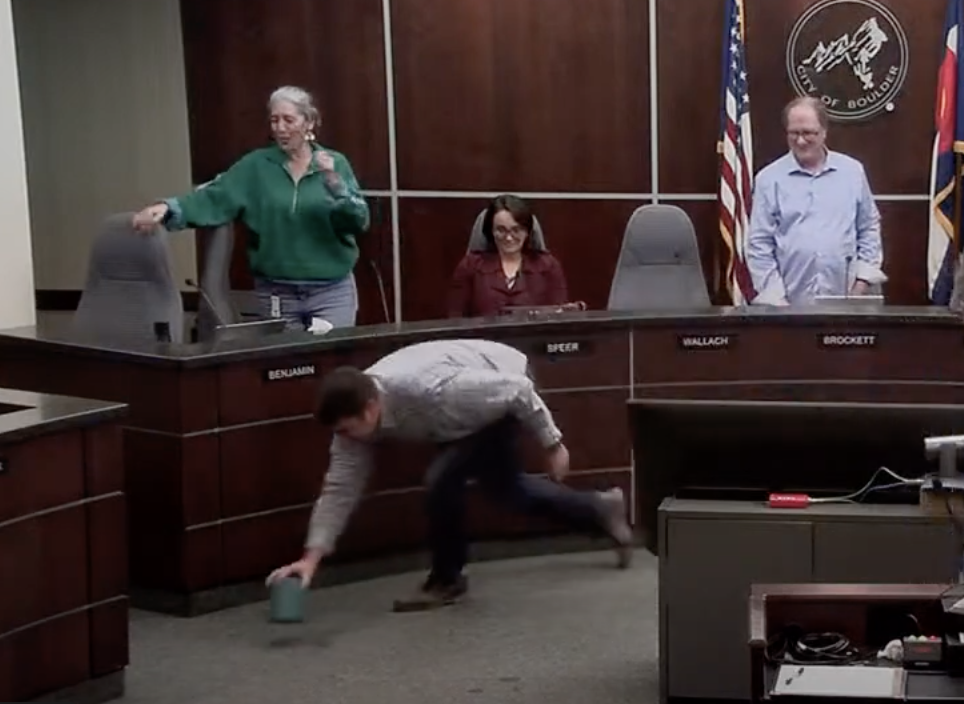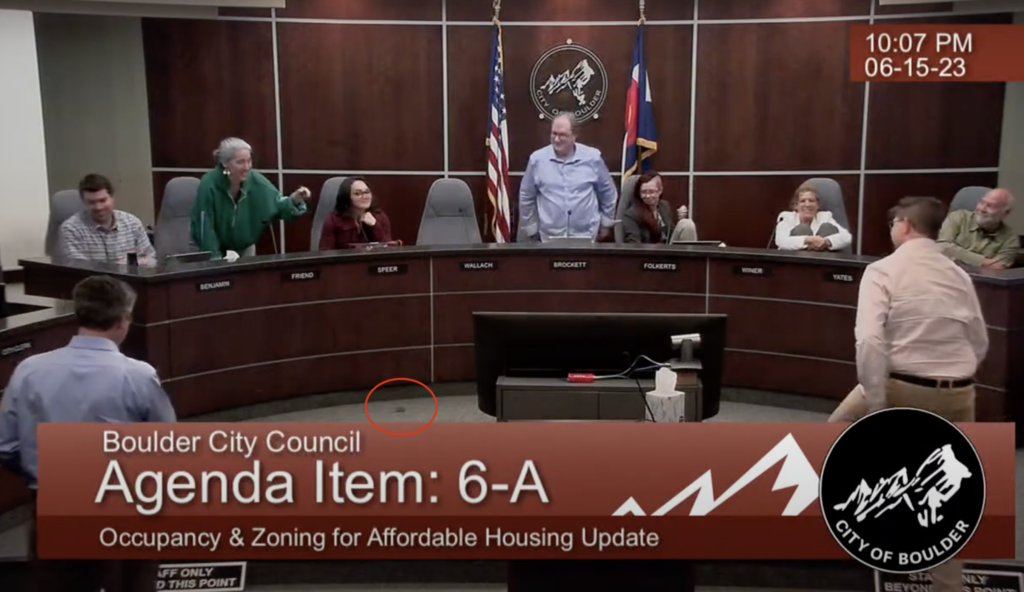Chamber mouse interrupts council discussion on Boulder’s housing crisis

Friday, June 16, 2023
Thursday’s meeting of the Boulder city council was notable in more than a few ways.
First, elected officials moved forward with two major policy shifts in a bid to chip away at the city’s affordable housing crisis: an increase in occupancy limits and a move to allow duplexes in previously single-family only neighborhoods. They also touched (again) on the beleaguered and controversy-plagued Police Oversight Panel, delaying an investigation into yet another complaint.
But there was also the highly unusual (and, frankly, bizarre) removal of an Open Space Trustee and, midway through the housing discussion, a live mouse appeared behind the council dais, necessitating a catch-and-release
Here, a brief recap of Thursday’s events, in descending order of importance:
Occupancy limits + zoning changes
Continuing work began almost immediately after their election, the council majority directed staff to prepare an ordinance raising Boulder’s occupancy limit — rules limiting how many unrelated adults can live together — to five, from the current three or four.
47,037 housing units in Boulder (2023)
– 51% rental
– 49% owner-occupiedOf rentals
– 33.4% are in zones allowing 3 unrelated adults to co-habitate
– 65.6% are in 4-person occupancy limit zones
No exceptions will be crafted for neighborhoods near the University of Colorado, residents of whom complain frequently of crowded streets, loud parties and trashy properties. The city has beefed up its rules on such “nuisances,” but continues to struggle with enforcement amid a staffing shortage.
The new occupancy rules will likely go into effect before a corresponding increase in enforcement, city manager Nuria Rivera-Vandermyde said. An August 21 public hearing and vote are tentatively scheduled for the increased limits.
Read more from the occupancy and zoning discussion
A longer debate centered over allowing duplexes, triplexes or other attached housing in neighborhoods that currently only allow single-family, detached housing. Most of Boulder’s residential land is restricted in this way.
58% of residential parcels are zoned for only single-family, detached houses
75% of land area for residential is SF only
To keep impacts low — and avoid a lengthy update to the Boulder Valley Comprehensive Plan — additional dwellings would still have to comply with existing density rules. That is, if the density limits for a particular zone allow only two dwelling units per acre, than an acre-sized lot could have a duplex instead of two detached single-family homes (as is currently allowed now).
Allowable density under the BVCP
RR (Residential Rural) zones = Less than 2 dwelling units per acre
RE, RL (Residential Estate, Residential Low) = 2 to 6 dwelling units per acre
The point is to allow more and smaller housing types, providing flexibility and, hopefully, relative affordability for future residents.
“A lot of houses are at the end of their useful life span,” councilwoman Rachel Friend said, in voicing her support. “They are going to turn over. Do we want a single-family home there, or something that is going to be more affordable 30 years from now?
“I’m an enthusiastic yes on building in future affordability that we failed to do 50 years ago.”
The changes — which include policies previously discussed in March, such as reducing parking and open space requirements and making it easier to build efficiency apartments — are set for a Sept. 21 public hearing and vote. (Dates, of course, are subject to change.)
Housing units in Boulder, by type
– Single-Family Detached: 18,736 units (37.8%)
– Single-Family Attached (Duplex, Triplex, Townhome): 4,254 units (9%)
– Multi-Family Attached (Condo, Apartment): 22,951 units (48.8%)
– Manufactured Housing: 1,096 units (4.4%)
Growth cap to be repealed
Boulder has had a 1% limit on growth, via housing units, in place since 1976. But it won’t last much longer, after a state law banning such limits.
The cap hasn’t actually been met in recent years. Between 2013 and 2022, Boulder averaged 0.8% growth, and still grew by less than 1% annually even after exempting affordable housing units, homes in mixed-use projects and dwellings in industrial or commercial areas.
“As designed,” staff noted in the meeting packet, “the system is not limiting growth within the city.”
Council members voted unanimously to repeal the policy, likely at the Sept. 21 meeting.
Learn more about the origins of Boulder’s growth limits
Police Oversight plans
It was a complaint that ultimately led elected officials to remove Lisa Sweeney-Miran from her seat on the Police Oversight Panel, and a complaint quickly followed the POP’s partial work stoppage, enacted in protest of the removal.
Although council is bound by city law to order an investigation into the most recent complaint, they are not required to do so within any set timeline, according to city attorney Erin Poe. The matter will be revisited July 13, when council returns from summer recess.
In the meantime, city staff will also draft language for an official time-out of POP’s review of new cases. The panel is continuing to review complaints against Boulder police that it had previously accepted; 10 cases should keep the group busy through the end of September.
Changes to the panel’s governing ordinance should be ready shortly after. A group is meeting every week to consider what those should be, and a consultant will also present her recommendations to city council in early October.
A July 27 study session is planned on those proposals. Community feedback can be provided via an online survey or a July 21 event.
If you go: 5-6:45 p.m. Canyon Theater at the main library (1001 Arapahoe Ave)
An official moratorium may provide legal cover to the POP for its work stoppage, and would allow them to focus on fixing the ordinance, council members said. All but Mark Wallach and Bob Yates seemed in favor of a moratorium.
“I would be remiss if I didn’t point out that the cessation of work that occurred was not requested of council,” Wallach said. “It was simply the determination of the board. What would we do if Planning Board said ‘We’re not gonna do our job?’
“I’m not looking to punish anybody, but if there’s a way to continue” without a moratorium, that would be my preference.
An interim monitor is continuing to review new complaints. Finalists for the open position are being selected from 53 applicants, the Daily Camera reported this week. A July 11 event will introduce finalists to the community.
Read more from Thursday’s brief discussion
Open Space Trustee removed
“It’s unusual to have a recommendation for removal” from one of Boulder’s many citizen groups, City Attorney Teresa Tate said, by way of introducing the topic. And yet, Thursday’s removal of Caroline Miller from the Open Space Board of Trustees marks the second removal this year.
City council acted on the recommendation of OSBT, who voted May 31 for Miller’s removal and replacement. She had been part of the board since March 2020.
Members of both bodies were careful to say their decision was motivated by Miller’s lack of attendance at OSBT meetings: she has missed six of 11 in recent months. But they were also disturbed by strange and unfounded accusations Miller made at a Nov. 9 meeting.
Miller alleged that the meeting packet contained unspecified “material differences” in data and “rules of procedure.” She then read four quotes from councilwoman Friend about various aspects of open space visitation and management, from the Nov. 3 city council meeting.
The connection or relevance of Friend’s words was not clear, and Miller declined several requests to provide clarification, according to fellow trustees. After making the claims, she abruptly left the Nov. 9 meeting.
Board chair Dave Kuntz, speaking Thursday, characterized Miller’s comments as “perplexing” and “difficult to understand.” Her “allegations … were perceived as threatening,” Kuntz said. “Security presence was requested at subsequent meetings,” and Miller’s actions and absences have been disruptive to OSBT.
Staff did attempt to investigate her claims, Kuntz said. No evidence was found to support them.
Read more: https://threadreaderapp.com/thread/1669514232092844032.html
Speaking in her defense Thursday, Miller said her removal was baseless and vowed to appeal.
“I’m not a finder of fact, but I am a seeker of truth,” she said. “I’m presenting to council my best understanding of the circumstances at the present time. My actions (Nov. 9) were done because I felt it was absolutely necessary to protect the integrity of the board.
“I absolutely knew prior there would be significant and real consequences that I would not want to face, but I felt compelled.”
Friend recused herself from council’s vote, which was unanimous. A replacement will be appointed after ongoing recruitment for other boards and commissions ends July 2.
Mouse in the house
It began with a warning. As the discussion on occupancy limits was drawing to a close, councilwoman Friend alerted Rivera-Vandermyde, “Oh my god, there’s a mouse right under your feet, Nuria.”
The next few moments were a confusion of mild screams and movement. Elected officials leapt from their chairs; Tate fled the room. Councilman Matt Benjamin grabbed a cup and gave chase to the mouse, aided by Code Enforcement Officer Jennifer Ross and Planning Director Brad Mueller.
“It’s not a Preble’s jumping mouse,” joked Mayor Brockett, referring to the threatened species of mouse found, among other places, in the riparian habitat of CU South.
Benjamin et al. were unable to capture the mouse. The small rodent — aided in its escape by the room’s “curved walls” — remains at large.
“It’s so much easier to catch when you can get a mouse into a corner,” Benjamin wrote in response to emailed questions. “It ended up running into a cut out and empty electrical conduit of the wall where Nuria, Teresa and staff sit.”
The mouse could not be reached for comment.

— Shay Castle, @shayshinecastle or on Mastodon at toot.bldrweb.org/@shayshinecastle
Help make the Beat better. Was there a perspective we missed, or facts we didn’t consider? Email your thoughts to boulderbeatnews@gmail.com
Want more stories like this, delivered straight to your inbox?
Governance Growth and Development Housing Aaron Brockett Bob Yates Boulder city council city of Boulder density development growth housing Mark Wallach Matt Benjamin mouse occupancy limits Open Space Board of Trustees OSBT Police Oversight Panel POP Rachel Friend rentals single-family zoning zoning
Sign up for a weekly newsletter from Boulder Beat.
Governance Growth and Development Housing Aaron Brockett Bob Yates Boulder city council city of Boulder density development growth housing Mark Wallach Matt Benjamin mouse occupancy limits Open Space Board of Trustees OSBT Police Oversight Panel POP Rachel Friend rentals single-family zoning zoning


Excellent!! The zoning restrictions enacted 50 years had huge and unexpected consequences: more cars, more pollution, less diversity and equity, driven by a very limited supply which created a Median Home Price of a crazy $1,500,000 (May statistic). The 1950’s need to end – Boulder loves to think of itself as progressive – now we’re finally walking the talk.